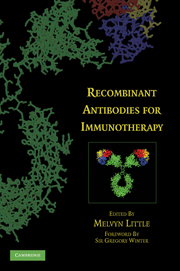Book contents
- Frontmatter
- Contents
- Contributors
- Foreword by Sir Gregory Winter
- Preface
- RECOMBINANT ANTIBODIES FOR IMMUNOTHERAPY
- PART I HUMANIZED ANTIBODIES
- PART II GENERATION AND SCREENING OF ANTIBODY LIBRARIES
- PART III TRANSGENIC HUMAN ANTIBODY REPERTOIRES
- PART IV ANTIBODY EFFECTOR FUNCTION
- PART V ARMING ANTIBODIES
- PART VI NOVEL ANTIBODY FORMATS
- PART VII ANTIGEN-BINDING REPERTOIRES OF NON-IMMUNOGLOBULIN PROTEINS
- PART VIII PROLONGATION OF SERUM HALF-LIFE
- PART IX INNOVATIVE IMMUNOTHERAPEUTIC APPROACHES
- PART X MARKET OVERVIEW AND OUTLOOK
- 24 Antibody Therapeutics: Business Achievements and Business Outlook
- Index
- Plate section
24 - Antibody Therapeutics: Business Achievements and Business Outlook
from PART X - MARKET OVERVIEW AND OUTLOOK
Published online by Cambridge University Press: 15 December 2009
- Frontmatter
- Contents
- Contributors
- Foreword by Sir Gregory Winter
- Preface
- RECOMBINANT ANTIBODIES FOR IMMUNOTHERAPY
- PART I HUMANIZED ANTIBODIES
- PART II GENERATION AND SCREENING OF ANTIBODY LIBRARIES
- PART III TRANSGENIC HUMAN ANTIBODY REPERTOIRES
- PART IV ANTIBODY EFFECTOR FUNCTION
- PART V ARMING ANTIBODIES
- PART VI NOVEL ANTIBODY FORMATS
- PART VII ANTIGEN-BINDING REPERTOIRES OF NON-IMMUNOGLOBULIN PROTEINS
- PART VIII PROLONGATION OF SERUM HALF-LIFE
- PART IX INNOVATIVE IMMUNOTHERAPEUTIC APPROACHES
- PART X MARKET OVERVIEW AND OUTLOOK
- 24 Antibody Therapeutics: Business Achievements and Business Outlook
- Index
- Plate section
Summary
It has become a business truism to highlight the contribution of monoclonal antibodies (mAbs) to the drug arsenal of physicians and to the revenues of the pharmaceutical industry. They have become mainstays of therapies for major inflammatory disorders and for a range of hematological and solid tumors. In 2007, mAbs had revenues of $24.8 billion, as estimated by ABN AMRO.
MAbs have outperformed as drug development candidates by showing attractive therapeutic indices in diseases with complex underlying molecular etiologies. They were also a compelling value proposition to the medical affairs departments of large pharmaceutical companies (“Big Pharma”), which first saw their potential for multiple indications and for pricing leverage, later for immunity to patent expiry. Time will tell to what extent mAbs can be protected by manufacturing patents or trade secrets and can thwart generic competition sustainably. It takes many levels of “robustness” for new technology to translate into billion-dollar products. These multiple dynamics have here been taken into account in attempting to describe the growth of the market for mAbs.
The success of the first generation of mAbs offers an interesting road map to the current wave of antibody and antibody fragment companies. I have therefore included a snapshot of these technology markets where so many entrepreneurial initiatives are already undergoing “robustness tests,” and give a perspective on the new research and development frontiers that the private sector is tackling.
- Type
- Chapter
- Information
- Recombinant Antibodies for Immunotherapy , pp. 373 - 402Publisher: Cambridge University PressPrint publication year: 2009



